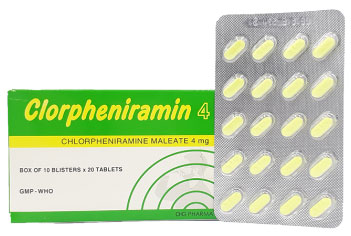Allergies, hay fever, or the common cold may not be life-threatening, but their symptoms can be very uncomfortable for patients. In such cases, patients need to use antihistamine medications, including Chlorpheniramine 4mg, an over-the-counter antihistamine that does not require a doctor’s prescription.
What You Need to Know About Chlorpheniramine 4mg
1. What is Chlorpheniramine 4mg?
Chlorpheniramine is an antihistamine medication used to treat allergic symptoms, hay fever, and the common cold. Chlorpheniramine 4mg is effective for symptoms such as rash, watery eyes, itchy eyes, itchy nose, itchy throat, itchy skin, cough, runny nose, and sneezing.
Chlorpheniramine works by blocking the effects of histamine produced by the body in response to allergens. Additionally, Chlorpheniramine inhibits acetylcholine, which helps reduce bodily secretions, alleviating symptoms like watery eyes and runny nose.
Antihistamine medications for nasal symptoms, cough, and colds have been shown to be unsafe or ineffective for children under 6 years old. Therefore, do not use Chlorpheniramine 4mg to treat cold symptoms in children under 6 unless directed by a doctor.

This medication treats allergic symptoms, hay fever, and the common cold.
Increasing the dose of Chlorpheniramine does not cure the allergy or shorten the duration of the illness; rather, it may lead to serious side effects. To reduce this risk, patients should carefully follow dosage instructions. Importantly, do not use this medication solely to help children sleep better.
Consult a doctor or pharmacist for alternative methods to alleviate cough and cold symptoms (such as staying hydrated, using a humidifier, or nasal sprays).
2. How to Use Chlorpheniramine 4mg
If patients purchase Chlorpheniramine without a prescription, read all instructions on the product packaging before use. If prescribed by a doctor, follow their guidance.
Chlorpheniramine 4mg is available in tablet, capsule, or liquid form, and can be taken with or without food. Users should adhere to the dosage instructions on the label or as directed by a physician. If the patient experiences stomach pain, it is advisable to take Chlorpheniramine after meals or when full.
When using slow-release capsules of Chlorpheniramine, swallow the whole capsule. Do not crush or chew slow-release tablets, as this can release all the medication at once, increasing the risk of side effects. Additionally, do not break slow-release tablets unless directed by a doctor or pharmacist.
For Chlorpheniramine in liquid form, patients should use a special dosing device to ensure accurate dosing. Do not use a household spoon for dosing. For suspensions, shake the bottle well before each use.
The dosage of Chlorpheniramine depends on age, health condition, and treatment response. Patients should not increase the dose or take more doses per day than recommended by their doctor or on the packaging.
Patients with stomach pain should take Chlorpheniramine after meals.
3. Side Effects of Chlorpheniramine 4mg
Possible side effects of Chlorpheniramine include:
- Drowsiness (common side effect);
- Dizziness;
- Constipation;
- Stomach pain;
- Blurred vision;
- Dry mouth, dry nose, or dry throat.
To alleviate dry mouth, patients may suck on sugar-free candies, chew sugar-free gum, or drink plenty of water.
If patients use Chlorpheniramine 4mg in slow-release tablet form, empty capsules may appear in their stool, which is harmless.
Notify your doctor immediately if any of the following serious side effects occur:
- Changes in mood such as agitation or confusion;
- Difficult urination;
- Rapid or irregular heartbeat;
- Seizures.
Chlorpheniramine has a low risk of causing severe allergic reactions. However, seek immediate medical attention if there are signs of a severe allergic reaction: widespread rash, swelling of the face, lips, tongue, or throat, or severe dizziness, difficulty breathing.
The above does not encompass all possible side effects when taking Chlorpheniramine. If patients notice unusual signs while using this medication, they should contact their doctor or pharmacist.
If difficulty urinating occurs while using the medication, notify your doctor immediately.
4. How to Prevent Unwanted Effects
Before starting Chlorpheniramine 4mg, inform your doctor of any allergies to this active ingredient, dexchlorpheniramine, or any other allergic conditions. Certain medical histories should be noted when using Chlorpheniramine 4mg:
- Respiratory conditions such as asthma, emphysema;
- Glaucoma;
- Heart problems, high blood pressure;
- Liver disease;
- Epilepsy;
- Gastrointestinal issues (such as ulcers or obstructions);
- Hyperthyroidism;
- Difficult urination, such as due to an enlarged prostate.
Chlorpheniramine 4mg can cause dizziness, drowsiness, or blurred vision. Alcohol or marijuana can enhance dizziness or drowsiness. Therefore, do not drive, operate machinery, or perform tasks requiring alertness or clear vision. To reduce dizziness and lightheadedness, patients should change positions slowly from sitting or lying down to standing.
Liquid products may contain aspartame, sugar, or alcohol. Caution is advised for diabetic patients, those with alcohol dependence, liver disease, phenylketonuria (PKU), or other conditions requiring dietary restrictions on these substances. Consult a doctor for safe use of these products.
Older adults are particularly sensitive to the side effects of medications, including chlorpheniramine allergy medication, especially the side effects of dizziness, drowsiness, confusion, constipation, or difficulty urinating. Excessive drowsiness, dizziness, and confusion increase the risk of falls.
Additionally, children may be more sensitive to the unwanted effects of this nasal allergy medication. In some cases, chlorpheniramine allergy medication can cause excitement in young children instead of drowsiness.
During pregnancy, women should only use this medication when absolutely necessary. Discuss the risks and benefits of taking the medication with a doctor.
Chlorpheniramine 4mg can cause dizziness and drowsiness; do not drive.
5. Drug Interactions with Chlorpheniramine 4mg
Drug interactions can affect the efficacy of the medication or increase the risk of serious side effects when using chlorpheniramine allergy medication 4mg. Discuss all medications the patient is currently taking (including prescription drugs, over-the-counter medications, and herbal products) with a doctor.
Some products that may interact with chlorpheniramine allergy medication 4mg include topical antihistamines (such as diphenhydramine cream, ointment, or spray).
Notify your doctor or pharmacist if you are using other products that cause drowsiness, such as:
- Opioid pain relievers;
- Cough medications like codeine, hydrocodone;
- Alcohol, marijuana;
- Tranquilizers or anti-anxiety medications like alprazolam, lorazepam, zolpidem;
- Muscle relaxants like carisoprodol, cyclobenzaprine;
- Other antihistamines like cetirizine, diphenhydramine.
Check the ingredient label of all medications being taken, as they may contain sedating components.
Chlorpheniramine allergy medication 4mg is similar to dexchlorpheniramine. Therefore, to avoid overdose, do not use medications containing dexchlorpheniramine while taking chlorpheniramine nasal allergy medication.
Chlorpheniramine allergy medication may interfere with and affect the results of certain laboratory tests (including allergy skin tests). Therefore, ensure that laboratory staff and all treating physicians are aware that the patient is using this medication.
Although chlorpheniramine 4mg is not a prescription medication, to ensure safety, the medication should be used at the correct dosage and for the intended purpose. Patients should consult with doctors or pharmacists before use. If any unusual symptoms occur during medication use, contact the nearest medical facility for timely intervention.
Note: The information about medications and brand names published in the Family Medicine Cabinet section on the Scimyst.com website is for reference only. Please consult a doctor before deciding to treat with any medication to ensure effectiveness and safety for your health.



















































